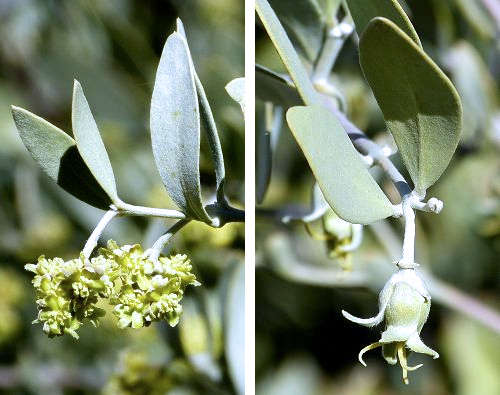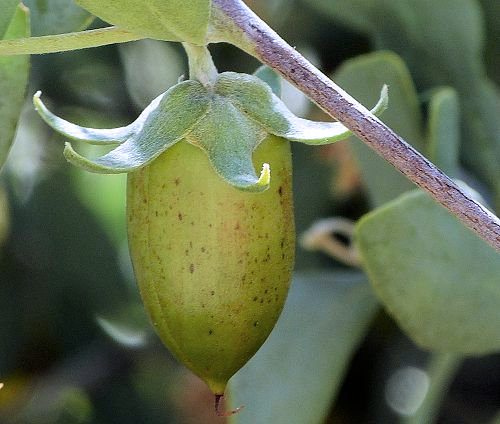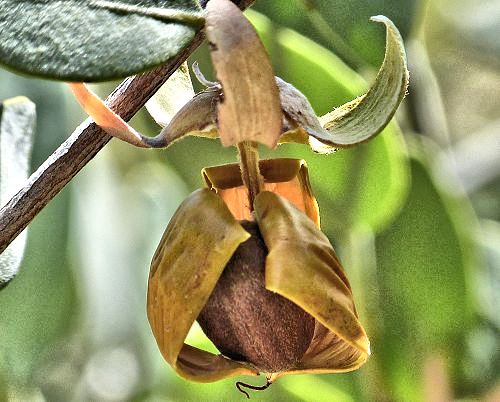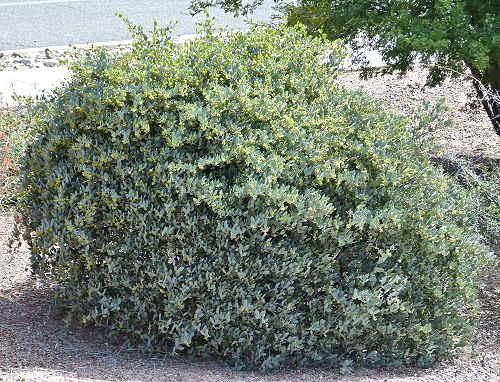Growing Simmondsia chinensis:
Jojoba
Description
Form: A multi-stemmed, long-lived shrub. Female plants are larger and more deeply rooted than male plants.
Leaf retention: Evergreen.
Growth rate: Slow to moderate depending on water.
Mature Size: 6-8' (1.8-2.4m) high and wide.
Flowers: Male and female flowers appear on different plants. Flowers on male plants are tiny, greenish-yellow, and clustered. Flowers on female plants are small, greenish, and usually solitary at leaf nodes.
Bloom: Early winter into spring, or spring into summer, depending on the local climate.
Fruit: With male plants present, an acorn-shaped, thin, fleshy capsule appears on female plants, usually containing one large, dark brown seed.
Leaves: Dull green, oval to lance-shaped, in upward-pointing pairs.
Stems: The dense branches are rigid, and somewhat irregular. No thorns.
Roots: One to several very deep taproots, which may exceed 30' (9m) deep in females.
Wildlife: The flowers attract bees. The leaves are browsed by large mammals, especially goats. The seeds are consumed by some small mammals and large birds.
Toxic / Danger: The pollen is a mild allergen. The seed meal is toxic to some mammals. Humans find the seeds edible, but poisonous in large quantities.
Origin: Southwestern North America.
Form: A multi-stemmed, long-lived shrub. Female plants are larger and more deeply rooted than male plants.
Leaf retention: Evergreen.
Growth rate: Slow to moderate depending on water.
Mature Size: 6-8' (1.8-2.4m) high and wide.
Flowers: Male and female flowers appear on different plants. Flowers on male plants are tiny, greenish-yellow, and clustered. Flowers on female plants are small, greenish, and usually solitary at leaf nodes.
Bloom: Early winter into spring, or spring into summer, depending on the local climate.
Fruit: With male plants present, an acorn-shaped, thin, fleshy capsule appears on female plants, usually containing one large, dark brown seed.
Leaves: Dull green, oval to lance-shaped, in upward-pointing pairs.
Stems: The dense branches are rigid, and somewhat irregular. No thorns.
Roots: One to several very deep taproots, which may exceed 30' (9m) deep in females.
Wildlife: The flowers attract bees. The leaves are browsed by large mammals, especially goats. The seeds are consumed by some small mammals and large birds.
Toxic / Danger: The pollen is a mild allergen. The seed meal is toxic to some mammals. Humans find the seeds edible, but poisonous in large quantities.
Origin: Southwestern North America.
Cultivation and Uses
USDA hardiness zones: 9-11. Below 20°F (-6.7°C), flowers and terminal parts of the branches are damaged and first year seedlings are severely damaged.
Heat tolerant: Yes.
Drought tolerant: Yes.
Sun: Full sun. This plant grows leggy in shade.
Soil: Well draining, pH 5.6-9.0 (acidic to highly alkaline). This plant is saline tolerant.
Water once established: Monthly, accommodating for rain.
Prune: The amount of water received determines how fast Jojoba will grow and how often pruning will be needed. Prune lightly to shape.
Litter: Low.
Propagation: Seed or cuttings.
Uses: Low water (xeriscape) garden, hedge, privacy screen. The seed contains an oily, indigestible, liquid wax which can be used as a skin softener.
USDA hardiness zones: 9-11. Below 20°F (-6.7°C), flowers and terminal parts of the branches are damaged and first year seedlings are severely damaged.
Heat tolerant: Yes.
Drought tolerant: Yes.
Sun: Full sun. This plant grows leggy in shade.
Soil: Well draining, pH 5.6-9.0 (acidic to highly alkaline). This plant is saline tolerant.
Water once established: Monthly, accommodating for rain.
Prune: The amount of water received determines how fast Jojoba will grow and how often pruning will be needed. Prune lightly to shape.
Litter: Low.
Propagation: Seed or cuttings.
Uses: Low water (xeriscape) garden, hedge, privacy screen. The seed contains an oily, indigestible, liquid wax which can be used as a skin softener.
Comments
Jojoba the only species of the Jojoba family (Simmondsiaceae). Other common names are Goatnut and Pignut.
Do you have additional information or a different experience for these plants that you would like to share? Email info@GardenOracle.com. All contributions are welcome and appreciated.
Jojoba the only species of the Jojoba family (Simmondsiaceae). Other common names are Goatnut and Pignut.
Do you have additional information or a different experience for these plants that you would like to share? Email info@GardenOracle.com. All contributions are welcome and appreciated.

Left - male flowers. Right - a female flower.



Latest update: September, 2024
© 2008-2026 by GardenOracle.com

